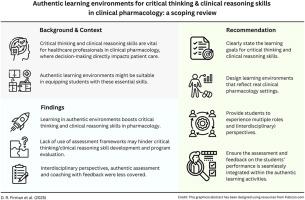临床药理学中批判性思维和临床推理技能的真实学习环境:范围审查。
IF 4.7
3区 医学
Q1 PHARMACOLOGY & PHARMACY
引用次数: 0
摘要
简介:批判性思维和临床推理是医疗保健专业人员的关键技能,特别是在临床药理学中,决策直接影响患者护理。然而,关于如何有效地培养这些技能的文献存在空白。因此,本研究的目的是绘制和检验医疗保健教育中真实的学习环境在培养药理学批判性思维和临床推理技能方面的证据。方法:我们对四个电子数据库进行了全面检索,以确定相关的初步研究。我们专注于调查和实施各种真实学习环境的研究。分析的重点是研究,涵盖和评估批判性思维和临床推理技能在真实的学习环境。结果按照PRISMA-Scr进行结构化和报告。在这一分析中,我们使用了Herrington和Herrington的框架来识别跨研究的真实学习环境的特征。结果和讨论:在141篇筛选合格的文章中,有31篇被纳入。这种对真实性的分析揭示了每种环境如何独特地促进了药理学中批判性思维和临床推理技能的发展。值得注意的是,整合基于模拟的学习、基于案例的学习和协作活动的环境与批判性思维和临床推理技能的显著提高有关。实施方式的多样性影响了其有效性,这表明学习环境中真实特征的深度整合倾向于提高学生的临床决策能力。总的来说,这些发现表明真实的学习环境可以大大提高临床知识在现实世界中的应用。本文章由计算机程序翻译,如有差异,请以英文原文为准。

Authentic learning environments for critical thinking and clinical reasoning skills in clinical pharmacology: a scoping review
Introduction
Critical thinking and clinical reasoning are crucial skills for healthcare professionals, particularly in clinical pharmacology, where decision making directly impacts patient care. However, there is a gap in the literature on how to foster these skills effectively. Therefore, the aim of this study was to map and examine the evidence of authentic learning environments in healthcare education in developing critical thinking and clinical reasoning skills in pharmacology.
Methods
We conducted a comprehensive search of four electronic databases to identify relevant primary research studies. We focused on studies that have investigated and implemented various authentic learning environments. The analysis focused on studies that covered and assessed critical thinking and clinical reasoning skills in authentic learning contexts. The results were structured and reported in accordance with PRISMA-Scr. For this analysis, we used Herrington and Herrington's framework to identify the characteristics of authentic learning environments across studies.
Results and discussion
Of the 141 articles screened for eligibility, 31 were included. This analysis of authenticity reveals how each environment uniquely contributes to the development of critical thinking and clinical reasoning skills in pharmacology. Notably, environments that integrate simulation-based learning, case-based learning, and collaborative activities are linked to significant improvements in critical thinking and clinical reasoning skills. The variety of implementation influenced their effectiveness, suggesting that a deeper integration of authentic characteristics in the learning environment tends to enhance students' clinical decision-making capabilities. Overall, these findings indicate that authentic learning environments can substantially improve the application of clinical knowledge in real-world settings.
求助全文
通过发布文献求助,成功后即可免费获取论文全文。
去求助
来源期刊
CiteScore
9.00
自引率
0.00%
发文量
572
审稿时长
34 days
期刊介绍:
The European Journal of Pharmacology publishes research papers covering all aspects of experimental pharmacology with focus on the mechanism of action of structurally identified compounds affecting biological systems.
The scope includes:
Behavioural pharmacology
Neuropharmacology and analgesia
Cardiovascular pharmacology
Pulmonary, gastrointestinal and urogenital pharmacology
Endocrine pharmacology
Immunopharmacology and inflammation
Molecular and cellular pharmacology
Regenerative pharmacology
Biologicals and biotherapeutics
Translational pharmacology
Nutriceutical pharmacology.

 求助内容:
求助内容: 应助结果提醒方式:
应助结果提醒方式:


